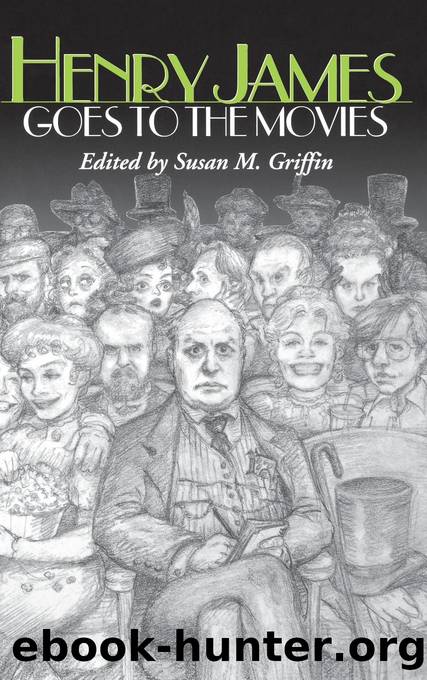Henry James Goes to the Movies by Susan M. Griffin

Author:Susan M. Griffin [M. Griffin Susan]
Language: eng
Format: epub
Tags: Performing Arts, Film, History & Criticism, Literary Criticism, Modern, 20th Century, American, General
ISBN: 9780813185415
Google: zUYoEAAAQBAJ
Publisher: University Press of Kentucky
Published: 2021-10-21T00:10:57.574523+00:00
The Wings of the Dove
If the elsewhere under scrutiny in Campionâs Portrait ultimately turns out to be the college dorm, in Iain Softleyâs The Wings of the Dove, it is the twenty-first century, that is, the perspective from which the contraptions of modem living and the pragmatic materialism that goes with them, in short, the values of the American century, will quaintly dissolve into a form of sentimentality, like the American heiress, Milly Theale (Allison Elliott). The decision, therefore, to remove the film from the cusp of the nineteenth century by setting it in 1910 makes the moment of the filmâs action a book-end to the moment of its production. Sandwiched between is all the technological, political, and moral âprogressâ that characterizes the century from which we now depart. If it could be called, in addition to the âAmericanâ century, the century of working-class vulgarity, mass culture, kitsch, it could also be called the âcinematicâ century (to the extent that all those terms are not redundant).
The doomed love affair of Kate Croy (Helena Bonham Carter) and Merton Densher (Linus Roache)âmanifest in such post-Jamesian courtship rituals as making out in elevators and fornicating in shadowy Venetian alleywaysârequires, both as its necessary middle term and unremovable obstacle, a self-deluding enchantment with the representative of everything America has to offer. Exactly what America does have to offer remains unsaid, but it is certainly much more or much less than money, although without its wealth it might well have gone unnoticed. In any case, whatever âitâ may be, it is already becoming a memory. If much of Jamesâs exploration of human psychology is about not getting it, to ask what âitâ is would surely miss the point and, in any case, be unpardonably vulgar. Is Milly Thealeâs unfathomable disease the result of a minute vulnerability in the recesses of her DNA, or is it the condition of perception that allows oneâs own best qualities to be reflected in the fragile and ephemeral cognizance of the other? Is it something to be captured through a more perfect system of biomedical pathology, or is it the trace of uncapturable otherness and unattainable desire?
The film hints its answer to these questions by showing Lionel Croy in an opium den to signify his serpentine depravity, as if to update Marx by indicating that in the twentieth century the opiate of the people is opium. In other words, instead of exploiting the play of absence endemic to film narrative, this film opts to stabilize and literalize. Hence we see Sir Luke examining (or is he treating?) Milly with the aid of carbon arcs, circular tubes, green glows, and sound effects, so simultaneously antiquated and bizarre as to evoke, not without some nostalgia, connotations of a mad scientistâthat gentleman whose primary residence is the âBâ movie, even if he sometimes leases a London flat. The tragedy of Millyâs circumstance, in this context, results from antiquated knowledge, in other words, from specific historical conditions under which an unwarranted and naive faith in wealth and science seemed appropriate, just as it did for the designers of the Titanic.
Download
This site does not store any files on its server. We only index and link to content provided by other sites. Please contact the content providers to delete copyright contents if any and email us, we'll remove relevant links or contents immediately.
Kathy Andrews Collection by Kathy Andrews(11838)
The remains of the day by Kazuo Ishiguro(9000)
Spare by Prince Harry The Duke of Sussex(5197)
Paper Towns by Green John(5191)
The Body: A Guide for Occupants by Bill Bryson(5098)
Industrial Automation from Scratch: A hands-on guide to using sensors, actuators, PLCs, HMIs, and SCADA to automate industrial processes by Olushola Akande(5062)
Machine Learning at Scale with H2O by Gregory Keys | David Whiting(4313)
Be in a Treehouse by Pete Nelson(4052)
Never by Ken Follett(3958)
Harry Potter and the Goblet Of Fire by J.K. Rowling(3860)
Goodbye Paradise(3811)
The Remains of the Day by Kazuo Ishiguro(3413)
Into Thin Air by Jon Krakauer(3400)
Fairy Tale by Stephen King(3400)
The Cellar by Natasha Preston(3346)
The Genius of Japanese Carpentry by Azby Brown(3309)
120 Days of Sodom by Marquis de Sade(3275)
Reminders of Him: A Novel by Colleen Hoover(3121)
Drawing Shortcuts: Developing Quick Drawing Skills Using Today's Technology by Leggitt Jim(3083)
